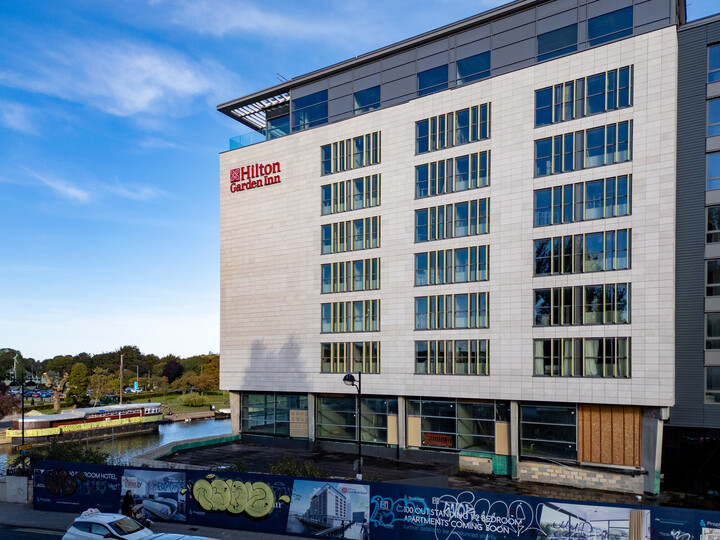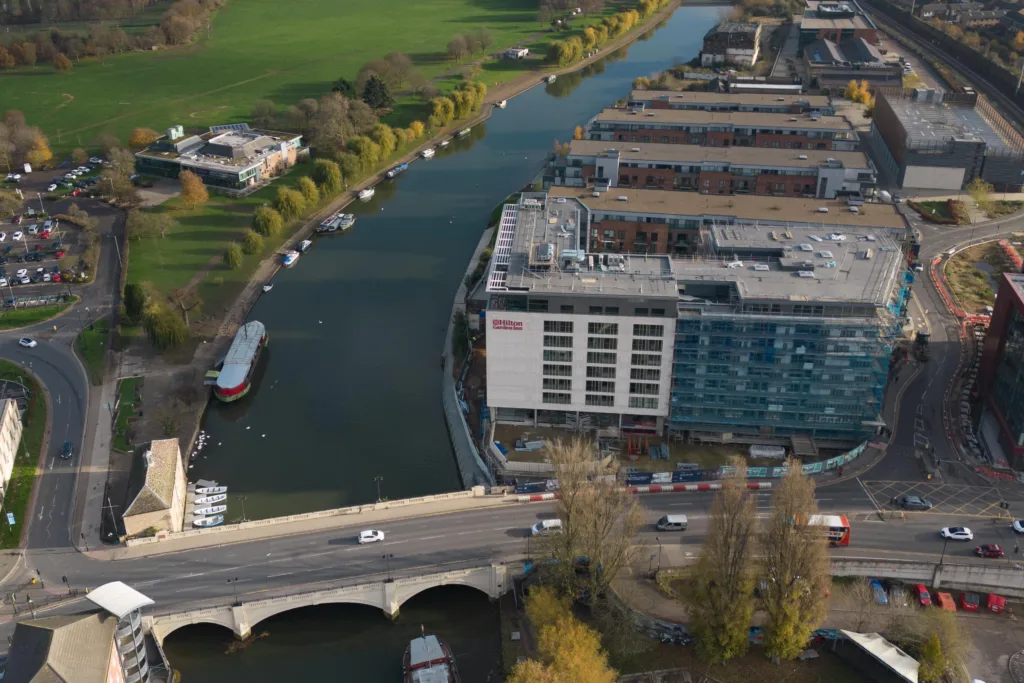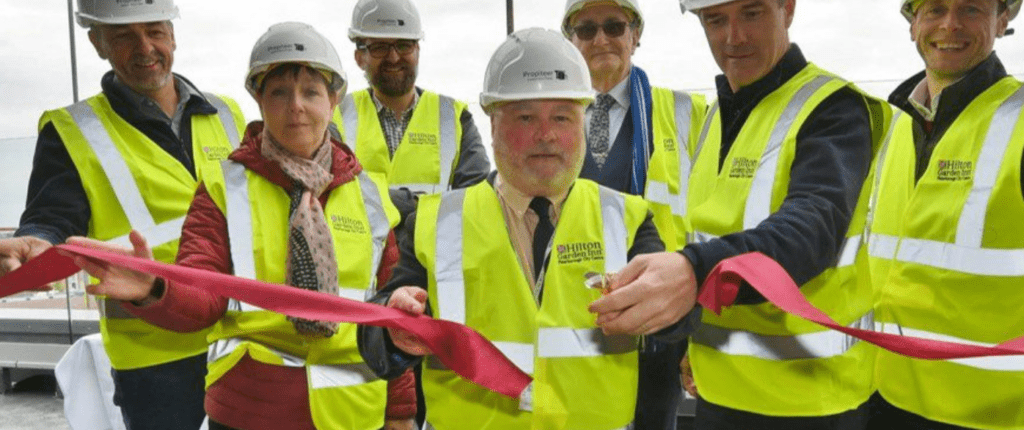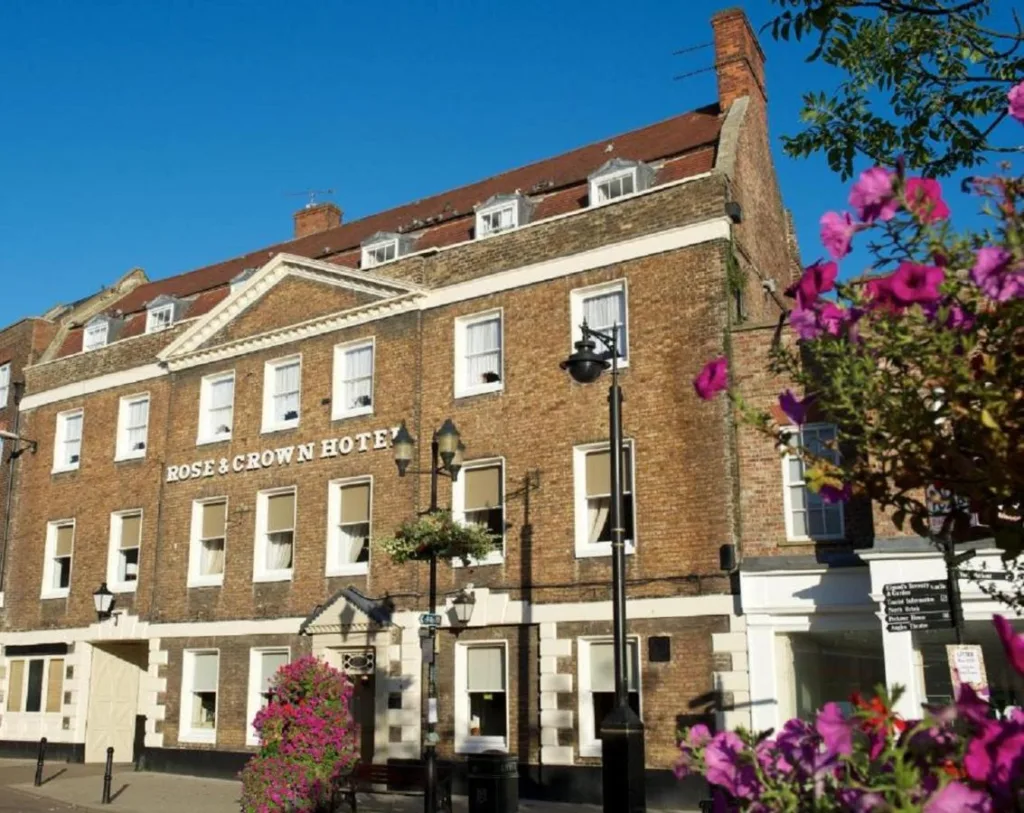In 2017, Peterborough City Council loaned £15m to fast-track a riverside Hilton. In 2025, the council moves to sell the unfinished site after years of delays, administration, and frustration. We track that 2017 Cabinet decision.
On the morning of 25 September 2017, the chamber of Peterborough City Council’s Conservative controlled Cabinet meeting was dominated by one agenda item: the future of the Fletton Quays site.
The regeneration of the riverside had been years in the making, involving joint ventures, detailed masterplans, and bold political promises. Now, the spotlight turned to a hotel—160 bedrooms, nationally branded, set against the backdrop of the River Nene and the cathedral skyline. The decision before Cabinet was whether the Council itself should step in and provide £15 million in finance to ensure the hotel’s construction could proceed without delay.
The debate was not merely about bricks, mortar, and beds. It was about risk, regeneration, financial prudence, and the Council’s role as an investor in its own city.
Declarations of Interest
As the meeting opened, Councillors John Holdich and Peter Hiller declared interests. Both were directors of the Peterborough Investment Partnership (PIP), the joint venture tasked with pushing forward key regeneration sites including Fletton Quays. Their roles, however, were non-remunerated, and the legal advice was clear: the decision at hand concerned Norlin Hotels Holdings Limited and its subsidiary, Fletton Quays Hotel Limited, not the PIP directly. They would remain in the chamber.
The weight of responsibility shifted to Cabinet as members turned to Agenda Item 7: Financing Approval for Fletton Quays Hotel.
Presentation of the Report
Councillor David Seaton, Cabinet Member for Resources, introduced the report. His presentation was grounded in the document prepared by Marion Kelly, Interim Corporate Director of Resources, and Andy Cox, Senior Contracts and Partnerships Manager.

The recommendation, Seaton explained, was to approve a £15 million lending facility for 24 months to Norlin Hotels Holdings Limited and its subsidiary, enabling the construction of the hotel. The loan would be commercial, secured, and—critically—profitable for the Council.
The report set out four recommendations:
- Approve the £15m facility for 24 months.
- Authorise senior officers to finalise due diligence, ground surveys, and business case approval.
- Authorise officers to conclude all legal agreements with Norlin Hotels Holdings Limited and associated franchises.
- Recommend to full Council an amendment to the Treasury Management Strategy to include Norlin Hotels Holdings Limited and its subsidiary as organisations eligible for secured loans.
The Case for the Hotel
The report was thorough. It traced the origins of the Fletton Quays scheme back to December 2014, when the Council entered into partnership with Lucent to form the Peterborough Investment Partnership. The PIP identified five priority sites, with Fletton Quays at the forefront. By 2015, Cabinet had approved a masterplan including new offices, residential apartments, leisure space, and crucially, a hotel.
The hotel proposal, Cabinet heard, was ambitious but grounded in experience. Norlin Hotels Holdings Limited had a strong track record, developing and operating hotels under global franchise brands. Their model was unusual: not just developer, but also franchise operator, ensuring responsibility from design through operation.
The hotel would stand riverside, offering views to the cathedral. Work was expected to commence in February 2018, with doors open by July 2019.
Financial Safeguards
Marion Kelly’s report made clear that the Council was not venturing blindly. Funding would come from the Invest to Save Programme, meaning the loan must pay for itself. The lending margin would not only cover costs but generate surplus, strengthening the Council’s Medium-Term Financial Strategy.
The safeguards included:
- Drawdown only against verified valuations: Each stage of construction would be independently valued by both the developer’s surveyor and the Council’s monitoring surveyor.
- Security: The loan would be secured against the land and the hotel building itself, ensuring the Council always held assets of equal or greater value than the outstanding loan.
- Due diligence: External experts—Grant Thornton for financial analysis and Gerald Eve for hotel market expertise—were already engaged. Early findings indicated no adverse concerns with Norlin’s directors or financial health.
- Developer commitment: If costs exceeded £15m, Norlin would inject their own capital to complete construction.
At the end of the 24 months, refinancing would occur—either through a bank, another institution, or potentially through the Council itself, pending future decisions.
Debate Among Cabinet
Discussion followed. Councillors questioned, probed, and clarified.
One concern was what might happen if the scheme collapsed. Officers reassured members that the Council would retain the land and building works completed to date. In such a case, the franchise brand involved had a vested interest and would likely assist in securing another developer to finish the project.
Another query was whether the loan terms complied with state aid regulations. Grant Thornton’s advice confirmed that the interest rate would be at a full market level, eliminating the risk of unlawful state aid.

Cabinet members also asked about timescales. The 24-month facility provided a buffer for delays, but optimism remained that the hotel would open before the deadline.
Seaton stressed again that the project was about regeneration first, return second. His view was that the Fletton Quays site wass coming forward quicker and better than anticipated.
Alternatives Considered
The report had considered one clear alternative: Do Nothing.
If the Council declined to provide finance, Norlin would seek private funding. That, however, could cause significant delays, leaving an active construction site adjacent to new residential blocks. Sales of those homes might falter, and the vision of a completed, vibrant riverside by 2019 would fade.
Moreover, the Council would lose the financial return from the loan itself. Cabinet members quickly agreed this was not an acceptable option.
The Resolution
After debate, the Leader called for a decision. There was no dissent.
Cabinet unanimously resolved:
- To approve the £15m facility for 24 months.
- To authorise senior officers to finalise due diligence and surveys.
- To authorise senior officers to finalise legal agreements with Norlin Hotels Holdings Limited and associated franchises.
- To recommend to Council the necessary amendment to the Treasury Management Strategy.
Reasons and Impact
The official reason for the decision, recorded in the minutes, was simple:
“The funding of this project would help the Council to contribute to the Fletton Quays Project Plan and to the growth, regeneration and development agenda. The Council was approached to fund development of the hotel in order to preserve the synergy of development on the site.”
The decision marked a turning point. With Cabinet’s approval, the hotel could progress in tandem with offices, apartments, and leisure spaces, ensuring the site was not left half-finished.
The Council’s role as lender would bring income, but more importantly, it would unlock the transformation of a derelict quayside into a modern riverside district.
A Broader Context
Behind the vote lay wider political and financial implications. Like many councils, Peterborough faced pressures on budgets and services. Investing £15m into a hotel was not without controversy. Yet Cabinet argued this was precisely the type of innovative, prudent investment required: one that was both safe and beneficial to the city.
The report’s financial implications section had spelled this out: the loan counted as capital expenditure, secured against the asset, with no need for a Minimum Revenue Provision charge. The Council would not only safeguard its money but make a profit, feeding directly into frontline services.
Legal sections underpinned the Council’s powers to act—through the Local Government Act 2003, the Localism Act 2011, and incidental powers under the LGA 1972. The decision was rational, lawful, and consistent with both government and CIPFA guidance.

Even ground conditions were addressed. Site investigations by White Young Green and Structural Soils Limited revealed no issues. If unexpected problems did arise, Norlin could walk away before purchase, eliminating Council exposure.
Looking Forward
As the meeting closed, there was a sense of momentum.
The Cabinet knew the decision would not be the final word. Full Council still had to amend the Treasury Management Strategy in October, and due diligence had to be signed off before funds were released. Yet the path was now set.
By July 2019, if all went to plan, visitors to Peterborough would check into a riverside hotel overlooking the cathedral, built not only with private ambition but with the confidence and backing of the city itself.
Fletton Quays would no longer be a derelict stretch of riverside but a living symbol of regeneration.
And the meeting of 25 September 2017 would be remembered as the night Cabinet gave its approval to the final piece of that vision.
UPDATE: October 2025
For years an unfinished Hilton Hotel has loomed over Fletton Quays in Peterborough, its shell haunted not by guests but by pigeons. The project began with promise in 2017, when the council borrowed £15 million from the government to loan to developers. Plans included a rooftop bar and terrace overlooking the River Nene, with the hotel due to open in 2019. But construction stalled in 2020, and in 2023 the developer, Fletton Quays Hotel Ltd, collapsed into administration.

Yesterday (Thursday) councillors finally voted to sell the property, though the process may take six to nine months. Labour councillor Mohammed Jamil, cabinet member for finance, admitted the scheme had consumed much of his time in office. Completing the project themselves, he said, would require “substantial additional borrowing” the council could not justify.
The saga has been marked by false starts. A preferred bidder withdrew earlier this year, leaving the hotel’s fate uncertain. Yet Jamil expressed confidence that a sale would succeed.
Lib Dem councillor Christian Hogg echoed many residents’ frustrations, saying the site had become a decaying liability. “We need to absolutely get this gone and, more importantly, delivered,” he told the meeting.
For Peterborough, the long-stalled dream may finally move on.
















